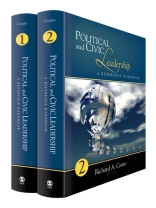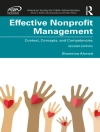This work within The SAGE Reference Series on Leadership provides undergraduate students with an authoritative reference resource on political and civic leadership. This 2-volume set focuses on the 100 most important topics, issues, question, and debates specific to politics and civic society. Entries provide students with more detailed information and depth of discussion than typically found in an encyclopedia entry while avoiding much of the jargon, detail and density one might find in a journal article or a research handbook chapter.
Key Features
Table des matières
Foreword
Introduction
About the Editor
About the Contributors
I. Introduction to Politics and Civil Leadership
1. Politics
2. Leadership
3. Leadership and Values
4. Citizenship
5. Civil Society
II. Philosophy and Theories of Political and Civic Leadership
6. Leadership as Virtue in Classical Philosophy
7. The Hero Myth
8. Social Origins of Authority
9. Philosophical Foundations of Political Leadership
10. Authority
11. Political Traditions: Conservatism, Liberalism, and Republicanism
12. Political Traditions: Left Political Movements and the Politics of Social Justice
13. Democratic Political Leadersip
14. Contemporary Leadersip Theories
15. Integral Leadership Theory
16. Political Violence and Discourse Theory
III. Purposes of Political and Civic Leadership
17. Common Good
18. Justice and Equality
19. Public Goods
20. Utopia
21. Peace
22. Warranted Hope
23. Liberty and Freedom
24. Human Rights
25. Empowerment
26. Social and Economic Development
27. Crisis Leadership
IV. The Failure of Politics
28. Political Violence
29. War
30. Corruption
31. Tyrannies Ancient and Modern
V. The Processes of Political and Civic Leadership
32. Elections and Electoral Systems
33. Policy Making
34. Lobbying
35. Advocacy
36. Citizen Advocay and Civil Society
37. Deliberative Democracy
38. Political Campaigns
39. Protest and Revolution
40. Social Movements
41. Free Spaces
42. Community Organizing
43. Truth and Reconciliation
VI. The Institutions of Political and Civic Leadership
44. Multinational Organizations
45. Bureaucracy
46. Political Parties
47. Presidents and Prime Ministers
48. Legislatures
49. Military
50. Legal Systems
51. Public Administration
52. Voluntary Sector
53. Philanthropy
VII. The Contexts of Political and Civic Leadership
54. Political Culture
55. Nationalism
56. Leadership Cultures
57. Civil Religion
58. Power and Participation
59. Gender and Power
60. Imperialism and Postcolonialism
61. Gender and Public Leadership
62. Race
63. Public Opinion and Public Judgment
64. The News Media
65. Globalization
66. Political Economy
67. Trust
68. Respect
69. Social Capital
VIII. The Psychology of Political and Civic Leadership
70. Personality and Leadership
71. Individuation and Archetypes
72. Political Correctness as Politics
73. Toxic Leadership
74. Altruism
75. Personal Origins of Public Commitment
76. Human Development
IX. The Tasks and Tools of Political and Civic Leadership
77. Speaking Truth to Power
78. Accountability
79. Ethics
80. Deception
81. Negotiating
82. Pragmatism and Compromise
83. Influence
84. Social Entrepreneurship
85. Conflict
86. Connective Leadership
87. Groups and Teams
88. Strategic Planning for Advocacy
89. Inclusive Leadership
90. Social Marketing
91. Internet
92. Technology and Governance
93. Storytelling
94. Impression Mangement
95. Social Networks
96. Popular Education
97. Building Community Through Advocacy
X. The Competences of Political and Civic Leadership
98. Leadership Competencies
99. Leading Self
100. Collaboration
101. Systems Thinking
102. Communication
103. Listening
104. Creativity and Innovation
105. Strategic Thinking
106. Scenario Planning and Leadership Development
107. Decision Making
108. The Precautionary Principle
109. Leading Change
110. Thinking and Learning
111. Emotional and Other Intelligences
112. Practical Wisdom
113. Leveraging Diversity
XI. Depictions of Political and Civic Leadership
114. Film Images of Leadership
115. Leadership and Sport
116. Biography and the Social Cognition of Leadership
117. Literature and Leadership
118. The Journey of Leadership
119. Aesthetic Leadership
120. Leadership, Humor, and Satire
Index
A propos de l’auteur
Richard A. Couto (Ph.D., Political Science, University of Kentucky) is with Union Institute and University and a founding faculty member of the Antioch University Ph D Program in Leadership and Change. Prior to that he was a founding faculty member of the Jepson School at the University of Richmond, where he held the George M. and Virginia B. Modlin Chair in Leadership Studies, 1991-2002. During that period, he spent two years as a Senior Research Fellow at the University of Maryland James Mac Gregor Burns Academy of Leadership. At the Jepson School, Dr. Couto helped develop a curriculum that integrates classroom instruction with community service. He also taught at Tennessee State University Institute of Government in the fields of community leadership, social movements, public policy, politics, and experiential education. He began his academic career directing Vanderbilt University’s Center for Health Services from 1975 through 1988. That center combined university resources with community assets—including local, grassroots leadership—in low-income areas of Appalachia and the rural South. He is considered a pioneer in the service-learning movement and a champion of the social change emphasis within it. His Kellogg National Leadership Fellowship, 1982-1985, recognized his work and permitted him to extend his studies at the international level. His work has won numerous national awards, including best book in transformational politics from the American Political Science Association, twice, the Virginia A. Hodgkinson Research Prize of the Independent Sector, 2000, and outstanding paper at the annual conference of the International Leadership Association in Amsterdam, 2005. Couto grew up in Lawrence, Massachusetts, and received a BA from Marist college and an MA from Boston college. Being a Boston red sox fan since birth prepared him for the vocation of politics, which Max Weber described as “a strong and slow boring of hard boards. It takes both passion and perspective.”












